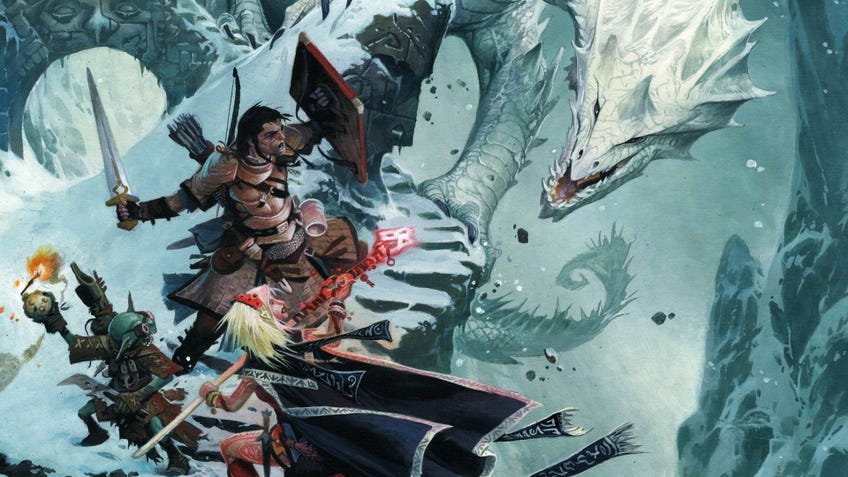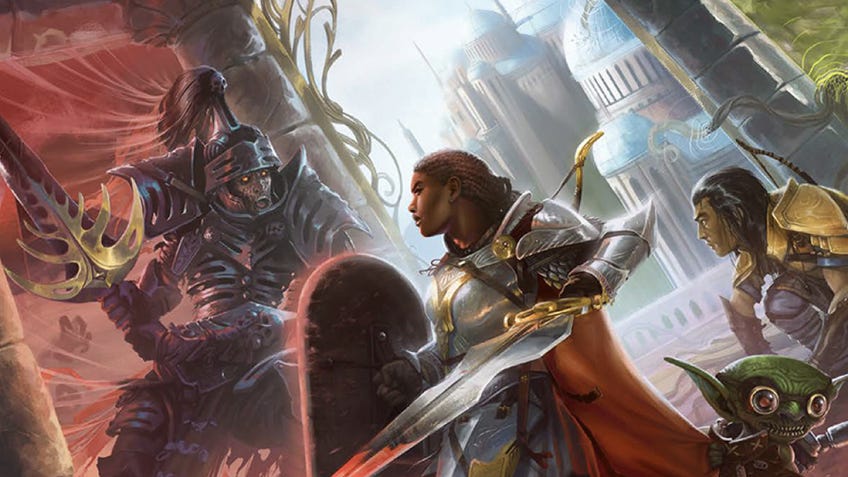Pathfinder Studio releases first draft of ORC universal roleplaying game licence for public comment
Paizo skipped Creative Commons in favour of a highly permissible and unalterable RPG licence.
Pathfinder and Starfinder RPG maker Paizo released the first draft of its Open RPG Creative (ORC) licence over the weekend and invited the public to submit their comments. The legal document is months in the work following Wizards of the Coast’s OGL fiasco and subsequent release of their rules into the Creative Commons, but Paizo has decided to blaze a different trail through the thicket of tabletop copyright protection.
The ORC licence aims to keep the spirit of Dungeons and Dragons’ original OGL alive by opening up any title using its framework for other creators to use, essentially cultivating a community of tabletop RPG rules expressions that designers can adopt without fear of legal reprisal or garden walls from larger corporations, such as Wizards of the Coast.
An accompanying document, cheekily called the ORC AxE (Answers and Explanations), references the previous complexity of intellectual property and mechanical expression creating a “stifling effect on creativity in our industry”, which introduces the need for lawyers - something smaller publishers and independent creators operating in good faith cannot afford.
“The whole point of the ORC is to give the gaming community comfort, confidence, and certainty. It gives our community a license that is not reliant on any one company,” Paizo states in the FAQ. “This is how we create what the open-source community refers to a virtuous cycle [sic] evolving our games to be the best they can be.”
Both the first draft and the AxE document are freely available to download from Paizo’s official website. Don’t feel too bad if the dense legalese seems impenetrable - despite efforts to “opt for simplicity wherever possible” Paizo said the effort proved challenging, and this first version of the ORC licence is their best attempt to date at presenting their goals in a way anyone can understand.
That complexity is in service to enshrining legal rights that reportedly can never be updated, deauthorized, revoked or amended by any entity. Neither Paizo nor any of the several other tabletop publishers who have since joined the ORC effort can claim any stewardship over the licence. Seattle-based firm Azora Law registered the trademark with the US Library of Congress, but Paizo states they will never enforce copyright over the licence or anyone using it.

Creators aren’t limited to tabletop RPGs, as anyone can use the rules expressions and other material created under the ORC for a board game, card game, wargame or even digital creations such as video games and virtual reality experiences. Paizo explained that the licence was designed such to not need system reference documents (SRDs), essentially a big list of terms, mechanics and other rules that comprise the mechanical engine, but folks should expect to see some form of it sometime in the future.
Why not a Creative Commons licence, similar to D&D’s recent move to release their latest SRD? Paizo says it didn’t fit with their vision for a virtuous circle, open-source community “We would have loved to make that work, but it would have violated the terms of the license to limit the downstream community to licensing out only their ORC Content.”
“Wizards used CC BY 4.0, which gives everyone the right to use the contents of the SRD they designated. This was a wonderful assurance for the gaming community that 5e could confidentially be used forever. Unfortunately, when another company builds on their SRD, their innovations are trapped in their product and not automatically relicensed to the gaming community.”
Paizo and Azora Law are accepting open comment and feedback on the ORC license’s first draft from now through April 21st via a dedicated Discord server, the link to which can be found on Paizo’s blog. The company claims it will continue iterating on the licence and soliciting more feedback until the majority of partnered publishers agree on a version. Optimistically, Paizo will publish a final version by the end of April.

